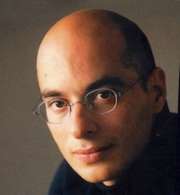|
Биография Bernard Werber
Bernard Werber (born September 18, 1961 in Toulouse) is a French science fiction writer active since the 1990s.
Werber was born in Toulouse (Haute-Garonne) in a Jewish family on 18 September 1961. Beginning at the age of 14, he wrote stories for a fanzine, an experience which would later be useful in his novels, such as L'Empire des anges (The Empire of the Angels). After leaving school, he became a Scientific journalist in Le Nouvel Observateur and Eurêka, the magazine of the Cité des sciences et de l'industrie in Paris for about a decade. During this period, he developed an interest in science, which he mixes with his favourite themes, ants, death and the origins of the human race.
Werber's works have been translated into 35 languages. With 15 million copies sold throughout the world, Bernard Werber is one of the most widely known modern French authors in the world.[citation needed] He even showed up in a TV program in South Korea once.
Following on from his book L'Arbre des possibles (The Tree of Possibilities), he started the Arbre des possibles Web site, a « project to research or imagine the possible futures for mankind. »
The first full-length film by Bernard Werber Nos amis les Terriens (Our friends the Earthlings) released in April 2007, was produced by Claude Lelouch.
His style of writing mixes different literary genres, notably the saga, the science fiction of the inter-war years, and tracts of philosophy.
In most of his novels, Bernard Werber uses the same form of construction, alternating informative articles in the style of an encyclopaedia and normal prose. The articles define or enlarge upon the ideas in the main text.
Also there are connections between his novels. One finds characters like Edmond Wells both in the trilogy Les Fourmis (The Ants) and in the L'Empire des anges (The Empire of the Angels). Also there are recurrent themes like l'Arbre des Possibles (The Tree of Possible Things) of Isidore Katzenberg, or even the novel Nous les dieux, which treats the ideas first presented in the short story L’École des jeunes dieux (The School of the Young Gods).
In the eight novels, Werber describes various authors. We are presented with an author who, at the end of his life, writes a last book which makes sense of his previous work. Thus in having a certain similarity of characters, themes and styles, one can conclude that he is trying to give a certain coherence to the ideas that he is developing.
|





